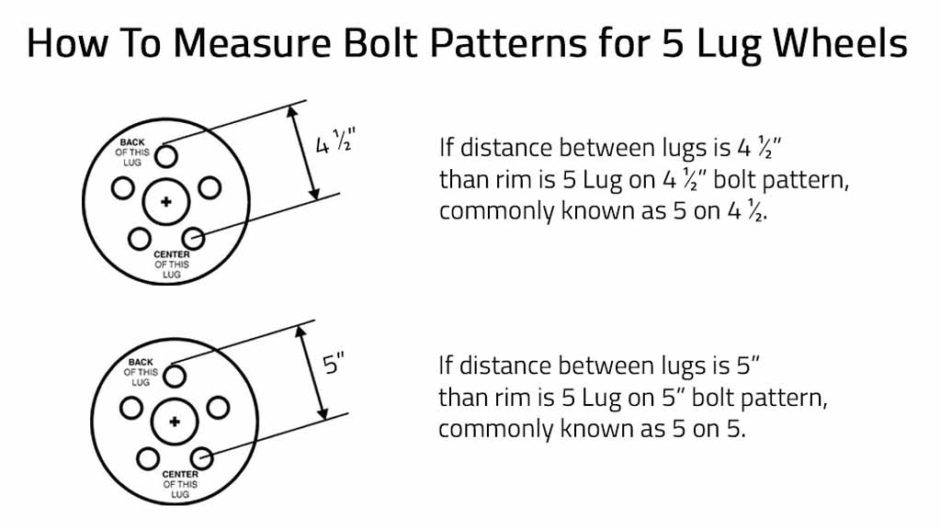Unlocking the Secrets of Your Wheels: A Guide to Measuring Rim Bolt Patterns

Wheels, those often-overlooked components, are more than mere circles of metal. They are the literal foundation upon which our automotive journeys rest. And at the heart of their functionality lies a crucial element: the bolt pattern. This seemingly simple arrangement of bolts dictates compatibility, performance, and ultimately, safety. Understanding how to decipher this code, how to measure a rim bolt pattern, is essential for any car enthusiast or responsible vehicle owner.
Imagine swapping out your factory rims for a sleek new set, only to discover they simply won't fit. This frustrating scenario can be easily avoided by grasping the fundamentals of wheel measurement. A rim’s bolt pattern, also known as the bolt circle or PCD (pitch circle diameter), determines how the wheel attaches to the vehicle's hub. Accurately measuring this pattern ensures a proper and secure fit, preventing potential hazards down the road.
The history of the bolt pattern is intertwined with the evolution of the automobile itself. As cars advanced, so too did the need for standardized wheel attachments. Early automobiles employed a variety of fastening methods, but the bolt pattern emerged as the most efficient and reliable. This standardization paved the way for interchangeable wheels, allowing for customization and improved performance.
Why is understanding how to determine a rim bolt pattern so crucial? An incorrect bolt pattern can lead to a range of issues, from minor vibrations to catastrophic wheel failure. Improperly fitted wheels can loosen over time, compromising steering and handling, and potentially causing accidents. Therefore, precise measurement isn't merely a matter of convenience; it’s a critical safety precaution.
The process of measuring a wheel bolt pattern might seem daunting at first, but with a little guidance, it becomes quite straightforward. The key is understanding the variables involved: the number of bolt holes and the diameter of the circle on which they are positioned. Whether you're dealing with a 4-lug, 5-lug, or even a 6-lug pattern, the fundamental principles remain the same.
Measuring a 4-lug pattern involves measuring from the center of one bolt hole directly across to the center of the opposing bolt hole. This provides the diameter. For 5-lug patterns, measuring is slightly different as there's no directly opposing bolt hole. You measure from the back edge of one lug hole to the center of the lug hole two spaces over. Several online resources offer bolt pattern diagrams and calculators to assist in determining your specific PCD.
Knowing your rim's bolt pattern empowers you to select compatible wheels when upgrading or replacing. It ensures a proper fit, preventing vibration and potential damage to the vehicle's suspension. Moreover, understanding the bolt pattern enables informed decisions about wheel spacers and adapters, further expanding customization options while maintaining safety.
To measure a rim bolt pattern, you will need a ruler or caliper. For 4-lug patterns, measure directly across from the center of one bolt hole to the center of the opposite bolt hole. For 5-lug patterns, measure from the back edge of one lug hole diagonally across to the center of the second lug hole. For 6-lug patterns, similar to 4-lug, measure center to center of opposite lug holes. Use a bolt pattern guide if needed.
One benefit of knowing your bolt pattern is safety, ensuring your wheels are properly fitted. Another benefit is the ability to explore a wider range of aftermarket wheel options, expanding customization possibilities. Finally, knowing your bolt pattern prevents costly mistakes by eliminating the purchase of incompatible wheels.
Advantages and Disadvantages of Measuring Rim Bolt Patterns
| Advantages | Disadvantages |
|---|---|
| Ensures proper wheel fitment | Can be slightly confusing for odd-numbered lug patterns |
| Prevents potential safety hazards | Requires accurate measurement tools |
| Expands wheel customization options | May require consulting online resources for complex patterns |
Accurately identifying your vehicle's bolt pattern is crucial for maintaining safety and maximizing performance. By following these guidelines, you can ensure that your wheels are properly fitted, enhancing your driving experience and preventing potential hazards. The ability to decode this crucial piece of automotive information empowers you to make informed decisions about wheel selection and customization, ensuring a smooth and safe ride.
Barefoot water skiing thrills on youtube
Decoding the happy face angry face meme phenomenon
Starboard secrets unveiling the mysteries of the right side of the boat
.jpg)











